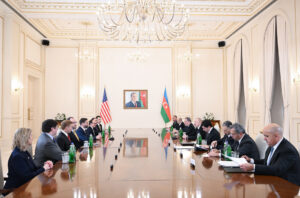China Urges U.S. to Adopt Rational Approach to Bilateral Relations, Criticizes Contradictory Policies

New York, The Gulf Observer: Chinese Foreign Minister Wang Yi, during a meeting with U.S. Secretary of State Antony Blinken on Friday, emphasized that the United States must adopt a rational and consistent approach towards China, moving away from contradictory policies of containment and cooperation.
Wang, also a member of the Political Bureau of the Communist Party of China Central Committee, criticized the U.S. for “encircling and suppressing China brazenly” while simultaneously seeking dialogue and cooperation. He urged Washington to develop a more accurate perception of China and to find a sustainable path for peaceful coexistence between the two powers.
“The United States should not always approach China with two faces,” said Wang. He added that if the U.S. genuinely seeks peace and stability, particularly in the Taiwan Strait, it should adhere to the one-China principle, cease arming Taiwan, and oppose Taiwan independence publicly. Wang also reiterated China’s opposition to U.S. interference in its internal affairs under the guise of human rights concerns, as well as suppression in trade and technology.
Highlighting the importance of mutual respect and reciprocity in diplomatic dialogue, Wang warned against the U.S. using its position of strength or past mistakes as justification for new confrontations. He also emphasized the need for the U.S. to remove barriers to people-to-people exchanges and avoid stirring unrest in sensitive regions, particularly the South China Sea.
On the Ukraine conflict, Wang maintained that China’s position is clear and transparent, stressing China’s commitment to promoting peace through dialogue. He called on the U.S. to cease blaming or sanctioning China over the issue and to avoid creating divisions.
Both sides acknowledged the candid nature of their discussions and agreed to pursue further dialogue and cooperation in line with the understandings reached by their presidents in San Francisco last November. They also committed to managing differences carefully and ensuring the stable and sustainable development of bilateral relations.
The two nations agreed to maintain open channels of communication on global and regional issues and to hold a new round of consultations on Asia-Pacific affairs in the near future.


